Reservoir Dogs: The Game and Deception
For those that aren’t familiar, Reservoir Dogs is one of those films that will forever be seen as one that changed the industry. It gives off the impression of being one of those typical organized crime films, but it is anything but that. It’s unorthodox because the story line is out of order and it goes over everything pre- and post- heist, however it doesn’t show anything that happened during the heist, and scenes often cut to characters back stories to fill in missing information. The movie has grown a sort of cult following, and even now when someone decides to give the old film a view there are still new things to find in the plot. The film starts out in a diner where viewers get to know the personality of each character. Each guy has his quirks and own way of talking cool, which goes along with the idea that the plot is put forward as a game. Each character involved in the job can be identified as a player in the game; furthermore, the game and deception that runs through the film is reminiscent of party games like mafia.
Characters (Players) and Instructions
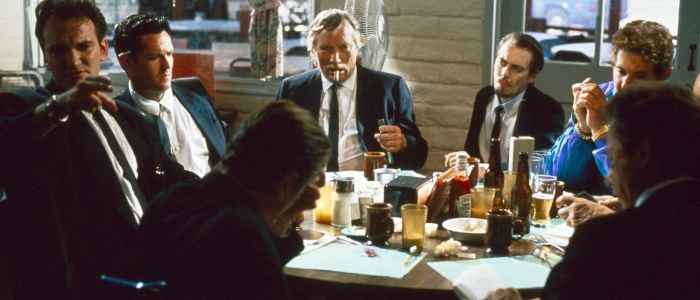
The intro scene does a good job at setting the stage for the rest of the film. It has all of the guys sitting around a table shooting the breeze over breakfast. The head honcho Joe Cabot is someone who gives a no bullshit attitude. His son Eddie does well to fill into his father’s shoes as he is the one who is inheriting the business. The rest are a motley crew of thieves. Mr. Pink is the weasel-like character who has a rationality for doing everything or nothing; such as, not tipping the waitress because society says so. Mr. Blue questions his rationality, but otherwise doesn’t do much throughout the film. Mr. Brown is the dopey guy, yet he’s analytical as seen when he analyzes pop-culture music. Mr. Orange is laid back and collected. Mr. White is like the father figure who tries to teach people life lessons, and Mr. Blonde is the reserved guy that wouldn’t hesitate to kill. Each character is given an alias to hide part of their identity, but it is almost reminiscent of a kids show like the power rangers where the rangers have a specific color attributed to them; furthermore, it could also be looked at as if each color resembled a role in a party or board game. Towards the end of the film, a scene is shown pre-heist where Joe has the group sitting down while he is going over the plan. He has everything drawn out on a chalk board. What’s interesting is that the scene is set up like a football team going over plays. This is yet another reference to the film being reminiscent of a game. Joe even says “Oh, you guys like to tell jokes and giggle and kid like around huh? Giggling like a bunch of young broads sittin’ at the school yard.” Although the film is about crime, it is ironic. It has a sense of play or entertainment in it even though the game plan is a diamond heist. The play isn’t fun for these characters because it’s all a game of deception.
Deception
The film has qualities of games like teamwork, using made up names, and the use of specific roles. It’s strikingly reminding of the game mafia. For those that haven’t played mafia, the rules are simple. Find out who the killer is. The game is one of deception as Reservoir Dogs also finds itself to be. The role of each player is anonymous so no one knows who has what role and they can only find out based on the player’s actions throughout the game. The game progresses by killing of characters who everyone votes as the killer. If the collective group find the “mafia” then they win, and if the mafia succeeds in killing everyone off, then that person wins. It’s almost like solving a mystery. This is exactly what happens in Reservoir Dogs. The heist goes wrong and each of the “players” have to find out who the “rat” is. The color coded characters plus the Cabot’s need to find out who set them up; consequently it ends up being Mr. Orange.
The Gameplay
Several factors play into the deductive reasoning that unfolds to reveal who the rat is. Most of the movie’s present time takes place at a rendezvous warehouse where all of the guys are supposed to meet after the heist. The first two to show are Mr. White and Mr. Orange who seem to have accomplished a mentor/mentee relationship. Mr. Orange on the verge of death after being shot in the gut asks Mr. White to hold him and then to take him to the hospital swearing that he won’t tell a soul about the whole situation. This already comes off as suspicious since he’s risking the job. However, Mr. White doesn’t take it that way and considers Mr. Orange a poor dying kid. Mr. Orange uses pathos on Mr. White by telling him to look at his eyes, which is something intimate and can be shared by people that trust each other. Mr. Pink interrupts this when he arrives, but Mr.Orange has already succeeded in gaining Mr. Whites loyalty therefore deceiving him.
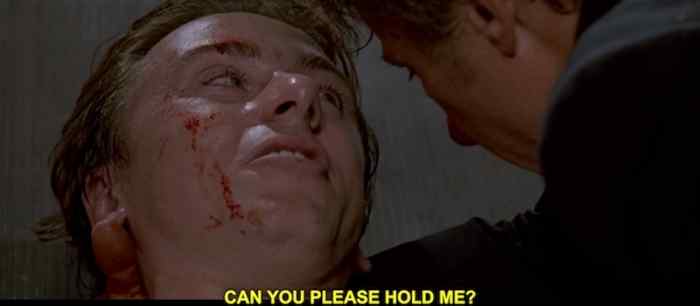
Mr. Pink is apprehensive about the whole situation that went down. He walks in and says, “was that a fucking set up or what?” Mr. Pink is a cynical character, and this allows him to view the “game” differently than others. He wants to avoid imprisonment. He even suggests ditching the rendezvous to get away, which may come off as a red-herring to the viewer since it may be suspicious, but he really just wants to get away. He is smart throughout the film even though he doesn’t seem like the most capable of characters. He refuses to share his real name with the others and swears that he is a professional. He is the only one paranoid enough to reason, avoid violence, and look for a solution. This however is not enough for him to avoid Mr. Whites red-herring. When Mr. Pink questions Mr. Oranges loyalty, Mr. White says that he cannot be questioned because his gunshot wound should be enough to prove his innocence. Luckily for Mr. Orange the unexpected gunshot wound ended up covering for him because if he wasn’t wounded the story may have turned out a lot different.
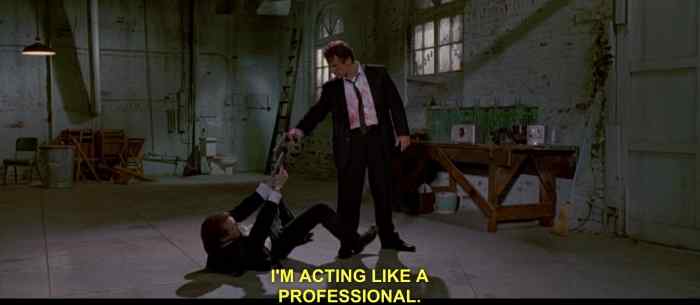
Mr. Blonde enters the warehouse while sipping a soda nonchalant. At this point, everyone is still pointing fingers, and Mr. Blonde is on the chopping block for acting like a maniac at the heist. This key in the art of deception in order to keep people far away from the truth. If there is chaos, it is almost impossible to figure out reality. The Three’s conversations are filled with accusations followed by threats at gunpoint. By this point, it is also revealed that Mr. Brown has been killed. This is exactly how chaotic a game such as mafia can be. Everyone starts pointing fingers at who the culprit may be and everyone uses their own deductive reasoning while remaining suspicious of the other. However there are ways to dissect chaos, Mr. Pink uses reasoning to conclude that Mr. Blonde is trustworthy since he is too psychotic to work with the cops, and Mr. Pink also reasons that Mr. White is clean. He excludes Mr. Brown from being the culprit because by this point he is revealed to be dead. Mr. Blonde gives the rest of the guys a sense of hope to solve the mystery by providing a gift, a kidnapped a cop. In any game of deception, moves like this can throw players of the original lead for truth.
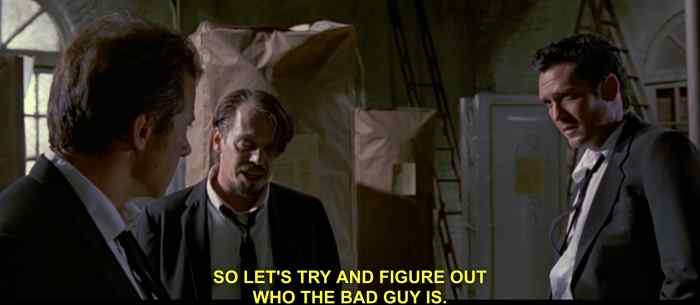
The cop gets beat, but doesn’t give any information on a set up, and when Eddie makes his appearance at the rendezvous, he says that there is no set up. His reasoning is that everything just messed up, but he intends to fix it and make a getaway, so he gathers Mr.Pink and White to continue with his plans. This may allow them and the viewers to forgo the ideas that a rat even exists, but the film changes pace. From here on out the viewers are revealed who the rat is.
Mr. Blonde uses his free time to further torture the cop and that’s when the rat lets himself known. Mr. Orange open fires on Mr. Blonde. He saves the cop, and at the same time reveals himself to the viewers as an undercover cop.
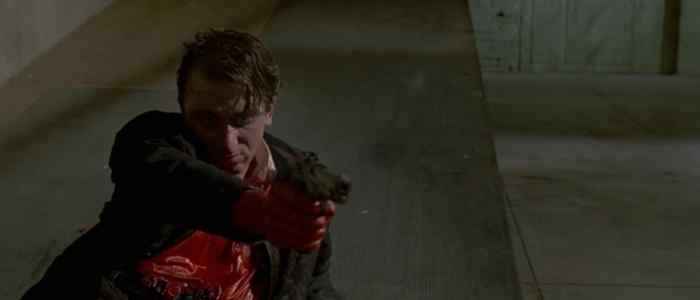
This revelation gives viewers a sense of satisfaction and surprise because Mr. Orange has been playing dead for a majority of the movie. Likewise, in a game of deception, the culprit is often someone unexpected. That person just knows how to play the part of deception well as has Mr. Orange. Games such as mafia tend to pit everyone against each other and that is exactly what happens when the rest of the group come back. Joe comes along right after and blames Mr. Orange as the sell out while pointing his guy at him. Consequently, Mr. White points his gun at Joe and Eddie points his gun at Mr. White. It’s a classic western standoff and they all fire. Joe and Eddie are killed and Mr. White is injured along with Mr. Orange. Mr. Pink avoided the whole scenario and runs off with the bag of diamonds. What follows is the noise of a shootout outside of the warehouse, and the film ends when Mr. Orange reveals his identity to Mr. White and the scene cuts in an ambiguous way leaving the audience wondering whether Mr. Orange lived or died.
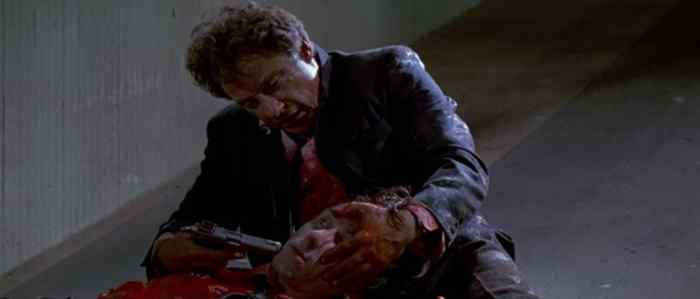
The Clues
Tarantino does a great job at leaking clues to foreshadow for the viewer the chaos that is to unfold. Some things are foreshadowed in the opening diner scene. There is reference to The Night the Lights Went Out in Georgia, a song about deception. This is foreshadowing that the heist will not go as planned. Another is when Mr. Orange snitches on Mr. Pink when Joe asks who didn’t contribute the tip. This reveals that he is the deceiver. Their fate is also foreshadowed when Mr. Blonde asks Joe if he wants him to shoot Mr. White. This is tell-tale of their deaths. Another scene where an implicit meaning is revealed is when Mr. Orange asks Mr. White to take him to the hospital. He says that he “won’t tell them anything.” This has a double meaning for Mr. White understands this to be the hospital staff and the police, but for Mr. Orange it also means that he won’t sell him out to his cop buddies.
Every “Dog” Has His Day
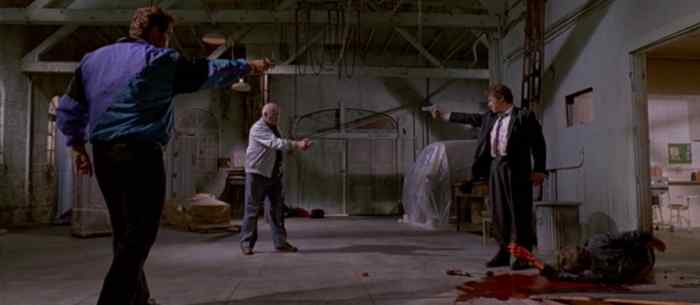
The film has an ironic twist on the proverb “every dog has his day.” Every criminal depicted in the film had the opportunity of a lifetime. Two minutes, get the diamonds, and get out, If this was done successfully their cut would be “juicy.” On the other hand, Mr. Orange had his chance to catch the bad guys when he was hired by Joe to be a part of the team. His accomplishment of their incarceration would have certainly raised his reputation. However, the irony is that in this case the proverb meant that the people involved in the crime would meet their fate, not the opportunity they were expecting.
Significance
In the debut film, Tarantino gave the world of film something aesthetically new, and that is why it has such a cult following. The violence for the film’s time is provocative. In an interview, Tarantino said that he wanted to give violence a sensation of realism in that one moment everything is fine and the next everything is in a bloody mess. Arguably before this film, movies were not nearly as bloody. The IMDb list of top 100 movies prior to the 90’s list movies like The Godfather, Star Wars, Back to the Future, and etc. that were never near the amount of gore and violence as Reservoir Dogs. It paved the way for that new element in film. He also played on flashback throughout the film and did not follow the traditional beginning, middle, and end in telling a story. What appeared to be the main objective for the film’s characters, which was robbing the diamonds is not even shown in the film. The disorder in the films story telling also reflects the disorder that the characters have to deal with in the story. This element of storytelling is continued in other Tarantino films such as Kill Bill and Pulp Fiction. Tarantino’s seemingly overnight fame in the early 90’s after the film’s debut also prove the message within the film, “every dog has his day,” and that is truly significant.
Works Cited
Mikieg. “Top 100 Movies Before 1990.” IMBd, 6 Aug, 2012. Accessed 22 Dec. 2016.
Naughton, John. “Empire Essay: Reservoir Dogs Review.” Empire, 1 Jan, 2000. Accessed 22 Dec. 2016.
“Quentin Tarantino Talks ‘Reservoir Dogs’ in Rare 1993 Interview.” Youtube. Uploaded by Eyes on Cinema, 9 Nov, 2014.
Tarantino, Quinten, director. Reservoir Dogs. Lionsgate. 1992.
What do you think? Leave a comment.











I watched this film every day for an entire Summer. It gave me my love for profanity. How is it that the music dies with Mr. Blonde? The radio is still on, No? Did Orange hit it with a stray bullet?
I found that there are still a lot of points in the film that are left to the viewers interpretation. That’s another thing that’s great about it, and wow everyday for an entire Summer! now that’s dedication.
Every day? I wonder what the side effects are.
And you wonder why our world is full of mass murderers. I recall renting this movie years ago and being disgusted by it. Never made it past the torture scenes. I’m still disgusted by it – especially in light of all that’s happened around the world in the last 15 or so years. To view this as entertainment or as having some value is pretty awful, but, sadly, not surprising. I’m guessing it’s required viewing for enlisted army and navy.
Yes, this is why we have mass murderers. You must’ve missed what happened in human society in the previous couple of millenia. You know, stuff like the Spanish Inquisition, the Crusades, slave trade, Vlad the Impaler. I’m pretty sure Jack the Ripper didn’t watch movies or TV. Humans have been doing bad stuff to other humans about as long as we’ve been telling stories about it. If you don’t like gallows humor, pulp fiction tales, horror moves, etc. that’s perfectly within your right, but don’t go around making ridiculous correlations and moral judgements about it.
great movie, had the awesome vibe of a jacobean tragedy.
I’d add Jackie Brown to the list of Tarantino’s masterpieces, and it’s his most un-Tarantino film. Very slow and minimalist, and extremely character driven–it was almost he had overdosed on Jarmusch. When the movie came out, I didn’t like it all. But that was because of expectations, a few years later I saw it again, and was blown away. The characters were very real. real people, nothing flashy or mythological about them, a la Kill Bill 2 (another masterpiece).
I tend to think Jackie Brown is the best film, while Pulp Fiction has the best scenes.
I still haven’t gotten the chance to watch Jackie Brown, but it’s definitely on my list of films.
great analysis
Thank you!
I just saw Reservoir Dogs for the first time a few months ago. It was good, maybe not the greatest movie ever, but now at least I can feel more pop-culture literate.
Mr. Orange is one of the hottest characters ever on film.
As a Breaking Bad fan, Reservoir Dogs is an interesting film for its apparent influence on Vince Gilligan’s use of colors in that series.
Weird timing for me that this article should be posted just days after I watched the entire movie after years of thinking I’d seen the whole thing but actually hadn’t.
and because this is as good a place as any to say it, Tim Roth as Mr. Orange really reminded me of Ryan Gosling, though of course Roth was doing this part years before Gosling burst on the scene.
Excellent write up and I really enjoyed this movie when I first saw it.
The best scene in the film is the Commode Story, which is like the perfect distillation of QT’s style. The quintessence of Quentin, if you will.
That scene demonstrates story telling at its finest.
Great post about a film that made me the director I am today. What an amazing film and well written article.
Thank you! Can you name some of your work. I’d love to check it out especially if you were inspired by Tarantino.
I once made a good friend of mine watch this hoping she would like it. And when she didn;t i was devistated.
You should try one of the other Tarantino films, but I have found that a lot of people can’t handle the gore.
Reservoir Dogs blew me away when I first saw it. I’d never seen a director get so much suspense out of people talking to each other. To me, this film, Pulp Fiction, and Kill Bill Vol. 1 & 2 are his masterpieces. His lesser films are the ones where he collaborates with others: Four Rooms, From Dusk Till Dawn, Sin City, Grindhouse. Those are the ones where he overemphasizes the kitsch and the splatter over characters.
I feel that the films where he is the sole director he really gets to put his talent into full practice. I enjoyed films like Sin City, and Dusk Till Dawn, but they carry a different vibe.
yikes. i have no clue what this article is about. is this author trying to say that this game, “mafia” influenced tarantino? or that the film resembles the game in some way? and if that’s so, then so what? there’s no coherent thesis here, just a lot of vague assertions.
your use of the ‘game-play’ theorem to sift through the various temporal shifts in the plot and interpret their potential meaning is really dynamite. I enjoyed the shift in perspective, learning more about movies I already relegated to my mental archives.
Reservoir Dogs is my favorite Tarantino film and also one of my favorite movies of all time, and this article was a great description of things I’d always felt but never could put into words. I also never made the connection between Mr. Orange being the one who snitches on who didn’t tip– maybe it’s time I rewatched it.
Solid article. I like the structure of it quite a lot.
Cool
This film seems to get a great deal of attention. I’m always confused as to why–it was OK but I never saw anything great about it. Despite that, a good essay.